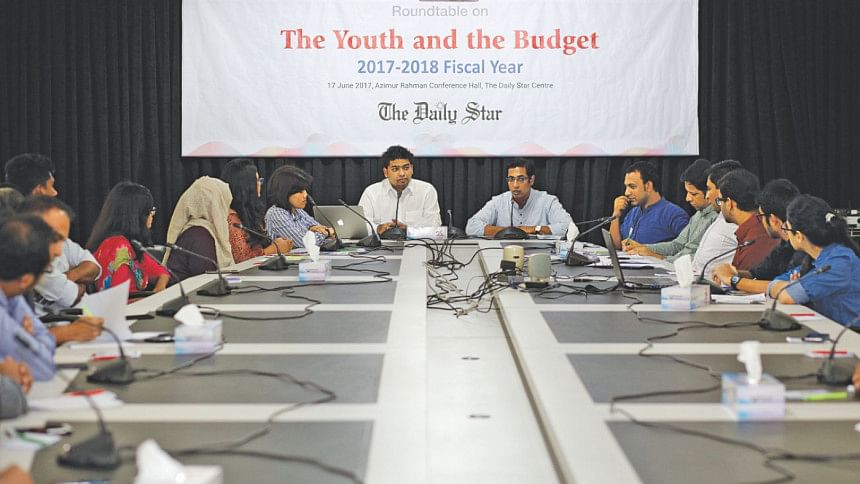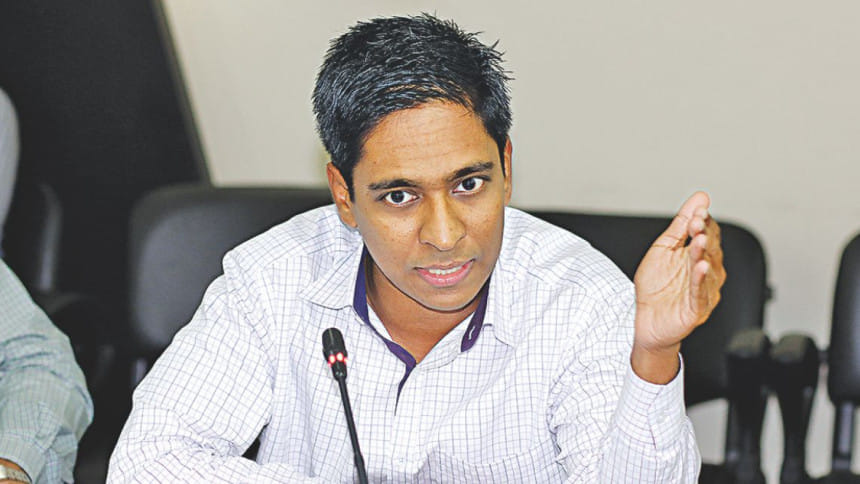Prioritising health care and sports for the youth

Very recently, at a roundtable organised by the Daily Star, youth leaders and students from Dhaka came together to talk about how the latest budget of the fiscal year 2017-2018 should have prioritised the youth, in terms of education, food business, entrepreneurship and so on. Ejaj Ahmed, President and Founder, Bangladesh Youth Leadership Center, however, also emphasised on health and sports for the young people. "The young people of this country have very limited access to sports facilities, especially women," he mentions. "Why should that be the case? In addition, they need to stay healthy -- both physically and mentally -- only then can they become global citizens."
"Given the fact that more than 52 percent of our population is below the age of 25, it is high time for us to invest in the next generation," Ejaj adds. According to him, this fiscal year, only 0.3 percent of the national budget of USD 51 billion is allocated for the Ministry of Youth and Sports, which is definitely not enough. "Of course, the youth is a cross cutting issue and different ministries work with youth. What would be useful, however, is if we can have a youth budget in each of the different ministries. For example, how much of the expenditure of the Health Services Division and the Medical Education and Family Welfare Division would be allocated for youth? In future, a break-down of allocation for youth would help us understand exactly the priorities of youth in the national budget."
Bangladesh Youth Leadership Center (BYLC), the country's first leadership institute, exists to build connections among youth from diverse backgrounds, equip them with leadership skills, and enable them to have high impact in public, private, and civil sectors. "All our efforts aim to strengthen prosperity, justice, and inclusiveness in societies worldwide," says Ejaj. Regularly working with education and educators, Ejaj also feels that the budget allocated to education is inadequate with regards to quality education.

"The new budget proposed an allocation of Tk. 50,432 crore for 2017-18 fiscal year for the education sector, increasing the allocation by around 14 percent from the 2016-2017 fiscal year. The rise in allocation is primarily due to the increased budget size and not because of greater investment in this sector," explains Ejaj. "This number is inadequate for ensuring quality education, especially because 68 percent of the education budget is spent on non-developmental purposes, mainly for teachers' salaries, leaving only 32 percent for development of quality education. Lack of development in the national curriculum will make the curriculum and books outdated. This will directly impact the quality of education, which, in turn, will make our youth entering the workforce less competitive in global standards."
Health is wealth. And a healthy workforce is central to having a productive workforce -- says Ejaj Ahmed. "To ensure overall development of the country, we must invest in both health and sports because both of these are related," he says. "When we grew up in Dhaka, we had fields and spent an hour every day playing football, cricket or badminton. Children these days don't have the opportunity to play because we have lesser fields and open spaces. Sports is replaced with Instagram, Snapchat, and Facebook. Therefore, you have a generation that is growing up in virtual reality and without much physical activity. This lack of physical activity is directly linked to fitness and productivity. Research shows that children who play sports do well in their studies, have stronger personality, and also perform well when they enter the workforce. Furthermore, parents who were involved in sports during their teens are more likely to encourage their own children to play sports. And we all know that physical fitness is directly linked to your health bills. Therefore, the government should invest heavily in sports and this will have multiple ripple effects. Engaging youth in sports can also be effective in promoting peace in society and ensuring better mental health. Also, we need a mindset shift to have more of our girls and women engaged in sports and physical activities. Many schools do not push female students towards sports, resulting in fewer number of girls active in the area. Many parents don't encourage their daughters to get involved in sports so we need to change this mindset also. There is a lack of space and playing fields in our country. We cannot change it overnight. However, making current facilities more women friendly can be a good step forward."
At the roundtable, Ejaj also put forward five key objectives that the Ministry could focus on as it moves forward in the coming weeks and months to develop a National Action Plan based on the National Youth Policy 2017:
1. To ensure that every young Bangladeshi is a productive member of the workforce.
2. To ensure good health and well‐being for all youth.
3. To encourage exercise of leadership and civic responsibilities among young people to strengthen social cohesion.
4. To create an environmentally conscious and technologically aware youth population.
5. To promote inclusive, equitable, and sustainable development among the youth.
To the young changemakers of Bangladesh, Ejaj says that communication and interactions must take place every day. "Our physical interactions are being replaced with online conversations. Social media can be a catalyst, but change happens in the real world, in real conversations. So we should invest more time and energy in physical interactions and less time on social media."
Secondly, Ejaj says that the young people must make the effort to making the change happen. "Change doesn't happen overnight," he says. "It's a process which requires both patience and persistence. Building anything takes time. But because of social media we are used to getting instant gratification. This needs to change if we are to become meaningful changemakers and doers."

 For all latest news, follow The Daily Star's Google News channel.
For all latest news, follow The Daily Star's Google News channel. 



Comments